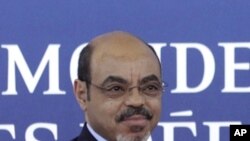Africa's chief negotiator at next month's climate summit says his objective will be to salvage at least the essence of the landmark Kyoto Protocol. Disagreements between rich and poor countries make it increasingly unlikely that the treaty will survive intact.
Ethiopian Prime Minister Meles Zenawi says Africa's official position at the climate summit in Durban, South Africa will be to insist on continuation of the Kyoto Protocol. The treaty, which was designed to fight global warming through the limiting of so-called greenhouse gases, is due to expire next year.
At a meeting of Africa's 10-member delegation to the summit, Meles acknowledged that the principle of saving Kyoto may be out of reach. As head of the delegation, the Ethiopian leader said Africa will have to adopt a flexible negotiating position to ensure that at least the spirit of the protocol survives in the face of powerful opposition.
"While we have a very clear position of principle on this matter, we are aware there are divergent opinions, and we are eager to engage all those actors on the Kyoto Protocol, with the purpose of at the very least salvaging the essence of the Kyoto Protocol," said Meles. "That will be our objective, but the means to that objective will be to engage all the key actors in Durban in a very flexible manner."
The 1997 Kyoto Protocol is widely considered out of date as both science and the political environment have evolved over the past decade and a half.
The United States did not ratify the original treaty, and several other powerful nations, including Canada, Japan and Russia have said they would not agree to a second period. Given the current global financial environment, Meles indicated Tuesday's strategy conference had concluded that this is not the time for the hard positions which led to failure of previous climate summits.
"We are going to Durban to negotiate, not to issue declarations of principle," Meles said. "So we have discussed ways of us engaging all the key actors flexibly. But of course flexibility does not mean lack of principle. You have to have your principle as an anchor, around which you can engage others flexibly."
The Ethiopian leader expressed hope that a previous deal on establishing a fund to help poorer countries adapt to climate change would be kept intact. The fund is supposed to provide up to $100 billion a year by 2020, but in the current economic environment, it has received no contributions, and there have been suggestions it should be renegotiated.
Meles said Africa remains hopeful that what he called “such a divisive debate on finance” would not be reopened in Durban.
Meles: Durban Summit Must Salvage 'Essence of Kyoto'











